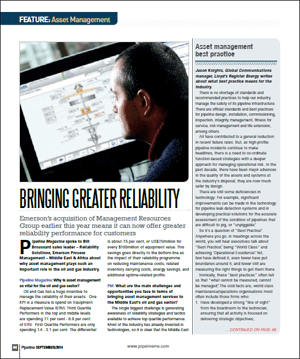Reliability of your production process equipment impacts the bottom line by maintenance costs, related carrying costs, energy usage, and additional uptime related to equipment performance. Making improvements in reliability require people, processes, tools, and organizational support to move beyond current maintenance practices.

Bill Broussard
Sales Leader, Reliability Solutions – Middle East & Africa
 In a Pipeline magazine article, Bringing Greater Reliability (pp. 44-48), the editors interviewed Emerson’s Bill Broussard on the role of asset management in the oil & gas industry. When asked why asset management is so vital for oil and gas producers, Bill explained:
In a Pipeline magazine article, Bringing Greater Reliability (pp. 44-48), the editors interviewed Emerson’s Bill Broussard on the role of asset management in the oil & gas industry. When asked why asset management is so vital for oil and gas producers, Bill explained:
One KPI is a measure is spend on Equipment Replacement Value (ERV). Third Quartile Performers in the top and middle levels are spending 7.1 per cent – 8.9 per cent of ERV. First Quartile Performers are only spending 1.4 – 3.1 per cent. The differential is about 7.5 per cent, or US$7.5million for every $100million of equipment value.
Obviously moving into the top quartile has tremendous economic impact. Bill underscored the challenge of
…developing a business case that leadership can understand and vet throughout their organisation.
To support this process, Emerson acquired MRG (Management Resources Group), which
…adds the deep asset-reliability consulting expertise of MRG to Emerson Process Management’s existing asset management capabilities to help customers who face growing needs to improve safety, increase plant uptime and reduce maintenance costs.
On MRG, Bill shared:
MRG brings to Emerson a large pool of talented reliable professionals coupled with their own intellectual property designed around standards and content libraries – elements which allow for consistent and repeatable solutions.
When asked about the growing need to ensure longer asset life cycles, Bill explained:
The infrastructure in the Middle East is getting older and reliability methods are becoming more critical to addressing profitability through improved maintenance costs. The resources employed in maintenance are also going through a skill transition which ranges from new-to-the-job to will-retire-soon.
Technology plays a role to provide early warning and provide more time for effective decision making and planning:
The cost to address an emergent problem without planning is 4-20 times higher than if it were planned into the future by 2-6 weeks.
The article also highlights the thoughts of Jason Knights with Lloyd’s Register Energy who notes the importance of clear objectives and responsibilities:
True world class practice requires applying a risk management system that cascades objectives throughout the organisation and ensures clarity of purpose. Perfect clarity around individual roles and responsibilities with regard to the planning and execution of that system is key.
To help bring together the justification and planning, execution, and ongoing support, Bill concluded:
MRG has substantially improved our ability to have someone come in and do a full turnkey study all the way to the implementation of the technology, and then in the ongoing maintenance and facility of the plant.
To connect and interact with other reliability and maintenance experts, join the Reliability & Maintenance track of the Emerson Exchange 365 community.




